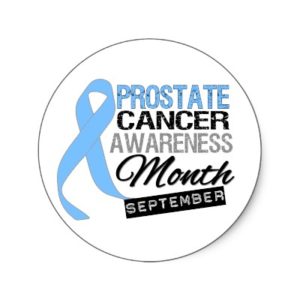September is National Prostate Cancer Awareness Month! This month is dedicated to remembering those lost to prostate cancer and to help spread awareness about prevention, diagnosis, and treatment!
According to the American Cancer Society, prostate cancer is the second leading cause of death in men. In fact, a man is 35% more likely to be diagnosed with prostate cancer than a woman is to be diagnosed with breast cancer! In most cases, prostate cancer is slow-growing which can result in it taking longer than normal to detect. However, according the to the Prostate Cancer Foundation, nearly 100% of men diagnosed and treated in the local and regional stages with be disease-free after 5 years! This shows how important early detection and lifestyle choices are in fighting this cancer.
So who is more at risk for getting prostate cancer?
-
Age – It is more commonly found in older men, and 65% of cases are diagnosed in men over the age of 65.
-
Race – African American men are at higher risk for developing prostate cancer.
-
Genetics – You’re 2x more at risk for developing the cancer if a father or brother was diagnosed.
Some other interesting and controversial risk factors include:
-
Inadequate sunlight which reduces vitamin D levels.
-
Not eating enough vegetables in your diet, especially cruciferous vegetables.
-
High calcium intake.
It is important to receive regular check-ups from your healthcare professional for early detection, as sometimes there are no signs you may have prostate cancer. However, if you experience any of these symptoms, you should seek medical attention and discuss with your doctor if you should be screened for prostate cancer:
-
Urinary problems
-
Blood in urine or semen
-
Difficulty having an erection
-
Frequent pain or stiffness in the lower back, hips, or upper thighs
It is recommended to start prostate cancer screening at the age of 40. A new gene test has been used to help identify slow-growing prostate cancer, which can help in early detection and reduce your risk for having to undergo invasive treatments. You should also make healthy lifestyle changes in order to prevent prostate cancer and other disease and illnesses. Our approach focuses on integrating modern medical technology with traditional, scientifically-proven methods of disease prevention. Call us today for your complimentary consultation 949-566-8179.


